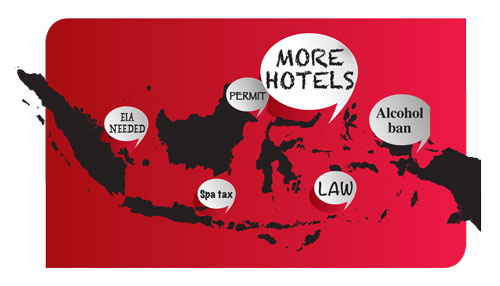Indonesia’s fragmented governance policy is weighing on tourism investment, just as the sector is picking up steam

The multivalence of regulations and taxation imposed by Indonesia’s regional governments, if not handled properly, could offset recent strides made in the country’s current positive tourism investment climate.
Tourism investment surged 17 per cent to US$268.5 million in 1Q2016, 95.5 per cent of which were foreign investments, according to Henky Manurung, head of tourism business investment division, Indonesia Ministry of Tourism.
“Favoured destinations are not only Bali and Jakarta, but also West Nusa Tenggara, Central Java and Yogyakarta,” he shared.
Investment opportunities are also growing as the central government is channelling efforts into developing the infrastructure in 10 secondary and tertiary destinations such as Lake Toba, Tanjung Kelayang (Belitung) and Tanjung Lesung (Banten).
While Indonesia’s decentralisation policy − which started in 2005 − has in some ways stimulated regional business and demand for hotels, several industry players also pointed to downsides arising from the political and economic devolution.
Ida Bagus Ngurah Wijaya, a hotel owner and former chairman of Tourism Industry Association Bali, said: “(Previously), hotel licences were set by the central government, so there was more uniformity in the requirements. Today, each regency government can set their own rules.”
Maulana Yusran, vice chairman – research, information technology and organisational affairs at Indonesia Hotel and Restaurant Association (IHRA), added: “The overlapping rules, regulations and taxation imposed by the regional governments have added burden to hotels’ operational revenue.”
For example, Papua’s ban on alcoholic distribution and consumption has aroused concern among hoteliers catering to the international community.
Elsewhere in the country, a hotel is required to obtain its own permits for location and environment impact assessment even if it sits in a designated area that already has the equivalent permits.
Krishnadi, chairman of IHRA Jakarta chapter, said: “Spa and entertainment spaces should be considered part of the hotel facilities, but (the Jakarta tax office) applied different tax rates for these (on top of) the hotel tax.”
He added the Regional Revenue Office of Jakarta had implemented a new rule that taxes promotions based on rack rates instead of discounted rates. In other words, a 10 per cent tax will still be slapped on a room priced at 500,000 rupiah (US$37.64), even when it is sold at 400,000 rupiah after a 20 per cent discount.
Maulana lamented: “The regional governments are finding ways to increase their income and hotels have become their targets.”
Ng Suwito, president director at Red Planet Indonesia, was less cynical about the government’s regional autonomy policy but urged the better implementation of regulations.
“For an investor and operator like us, regulation changes are part and parcel of doing business, but we do not like surprises. We need to plan and manage (costs).”
A further consequence, Ng said, is that the tax incidence would fall on the end-consumer.
“At the end of the day, we have to pass (the additional cost) on to somebody else. We have no choice but to increase the ADR and the consumer will (have to) bear it.”
This could compound the challenges already faced by hotels, such as an oversupply of rooms in some destinations.
The Bali Hotel & Branded Residences Report 2015 issued by Horwath HTL and C9 Hotelworks noted that slower demand in 2015 resulted in the market struggle to maintain both occupancy and rate.
Meanwhile, Bali’s supply is still increasing, with the same report projecting the addition of 115 new hotels and 15,000 rooms by 2019, taking the total key count to around 55,000.
Arief Yahya, Indonesia Minister of Tourism, agreed that government regulations had hampered Indonesia’s development, including the hospitality sector.
He said: “One of our weaknesses as a country is that we are very slow. Regulations have slowed us down.”
Arief added that Indonesian president, Joko Widodo, has set 2016 as the year to accelerate deregulation, and he invited IHRA to submit a list of regulations which they believe were stumbling blocks for businesses.
The ministry has also set up a working group to come up with ways to help the industry to better compete with neighbouring countries.
This article was first published in TTG Asia, August 5, 2016 issue, on page 6. To read more, please view our digital edition or click here to subscribe.




















